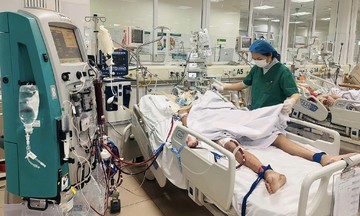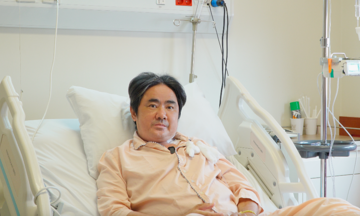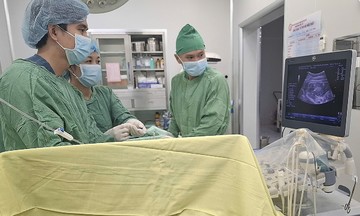On 12/9, Doctor Pham Hai Uyen, Deputy Head of the Neurology Department at Children's Hospital 2, reported that the boy underwent surgery to clean and stitch the wound. He is also receiving nutritional and psychological support. The family said the boy has a history of tic disorder and frequently bites his tongue.
 |
Medical staff in the operating room at Children's Hospital 2. Photo: Quynh Tran |
Medical staff in the operating room at Children's Hospital 2. Photo: Quynh Tran
Tic disorder typically emerges in children between the ages of 4 and 8. It's marked by sudden, intermittent, repetitive, and stereotyped involuntary movements, often affecting the head and upper limbs. While not life-threatening, the disorder can disrupt daily life and impact a child's quality of life.
According to Doctor Uyen, tic disorder accounts for about 50% of movement disorders in children. It is also one of the most common conditions seen in pediatric outpatient clinics at the hospital. Some children are hospitalized due to injuries, severe behavioral and emotional disturbances, or suicidal thoughts.
Motor tics often manifest as persistent blinking, unexplained winking, grimacing, head jerking, neck shaking, shoulder shrugging, or unusual arm or leg twitching. These movements are abrupt, rapid, repetitive, and uncontrollable. Vocal tics can include throat clearing, coughing, sniffing, grunting, making unusual sounds, or repeating words or syllables.
These symptoms tend to worsen with stress, anxiety, or when the child is the center of attention. They diminish or disappear during sleep and sometimes subside when the child is highly focused or engrossed in play. Children are often aware of their tics but cannot control them, and attempts to suppress them can lead to discomfort and restlessness.
Doctors advise parents to closely observe any unexplained repetitive behaviors in their children, especially if they persist for more than 4 weeks. Avoid scolding or labeling the child with terms like "pretending" or "doing it on purpose." Spending quality time interacting with the child, limiting screen time, and encouraging physical activity can help mitigate the negative impacts.
If tic disorder is suspected, parents should consult a pediatric neurologist or child psychologist for early diagnosis and advice. The disorder is treatable, and the tics may disappear as the child grows older, but they can easily recur.
Le Phuong












